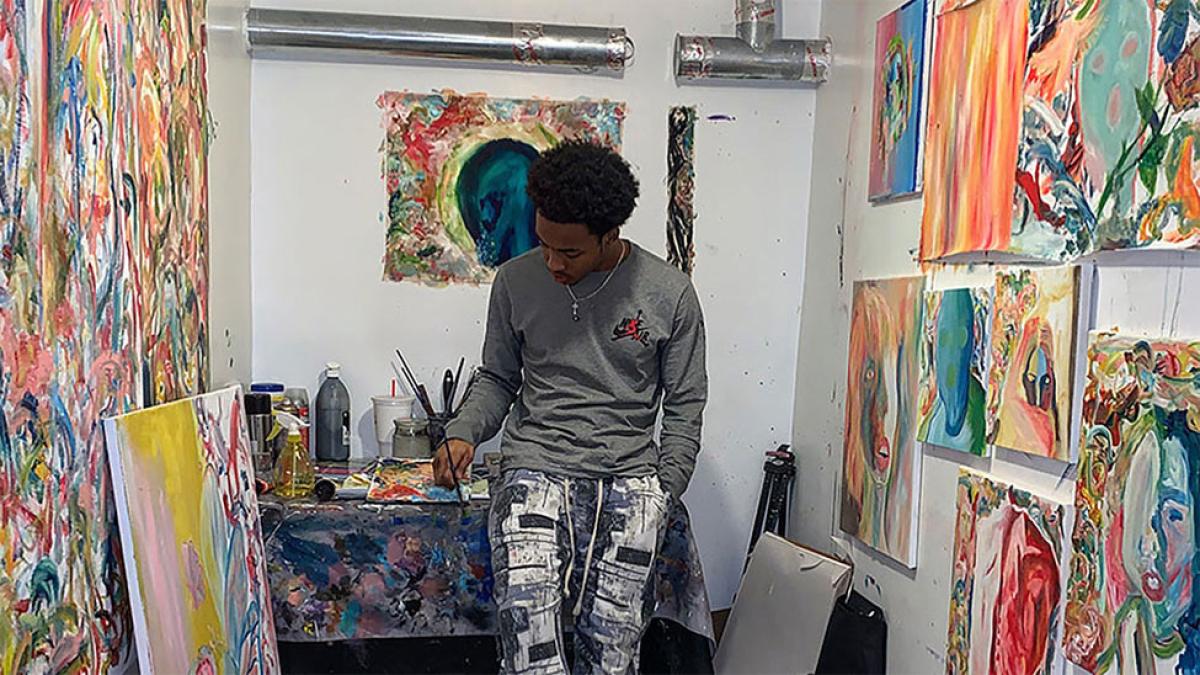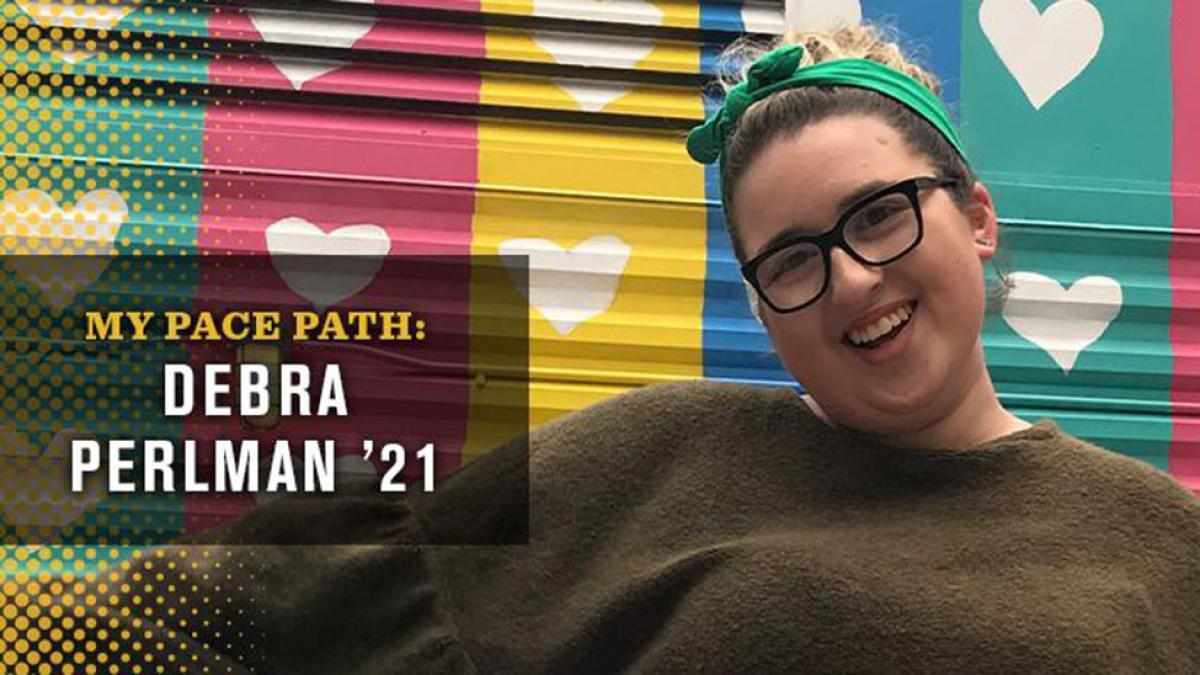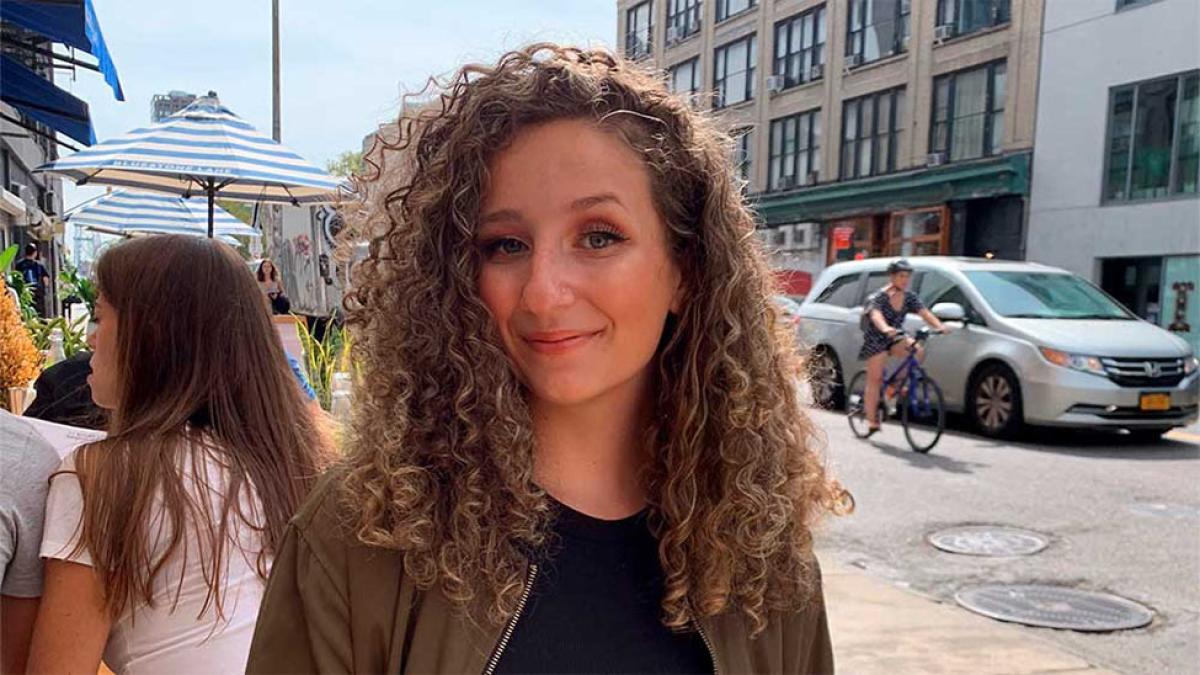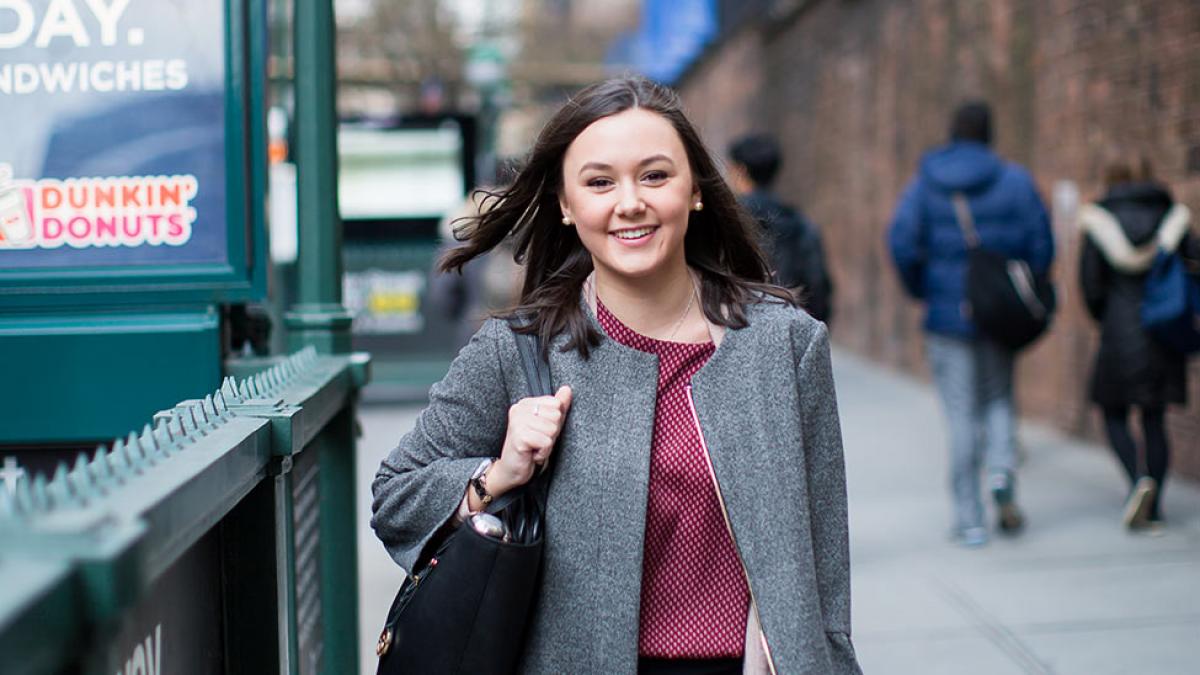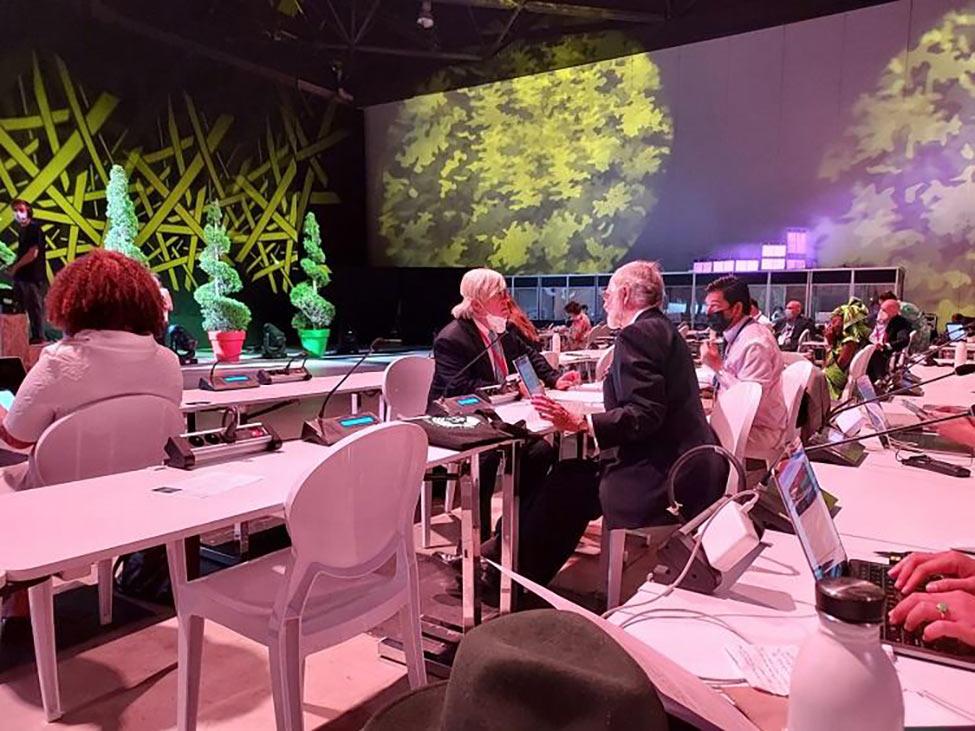
Haub Law’s Global Center for Environmental Legal Studies Plays Integral Role at IUCN World Conservation Congress
The Global Center for Environmental Legal Studies (GCELS) at the Elisabeth Haub School of Law at Pace University successfully submitted and advocated for the adoption of groundbreaking motions to strengthen human rights and environmental protections at the International Union for the Conservation of Nature (IUCN) World Conservation Congress, which took place in Marseille, France from September 3 to September 11, 2021. Haub Law is one of only two law schools in the United States that is a voting member of the IUCN. Decisions made at the conference have wide-reaching implications for environmental law and policy around the globe.


The Global Center for Environmental Legal Studies (GCELS) at the Elisabeth Haub School of Law at Pace University successfully submitted and advocated for the adoption of groundbreaking motions to strengthen human rights and environmental protections at the International Union for the Conservation of Nature (IUCN) World Conservation Congress, which took place in Marseille, France from September 3 to September 11, 2021. Haub Law is one of only two law schools in the United States that is a voting member of the IUCN. Decisions made at the conference have wide-reaching implications for environmental law and policy around the globe.
“GCELS’ work with IUCN is guided by the paramount need to strengthen environmental rule of law and ensure human rights and environmental justice for communities most affected by climate change and environmental degradation,” said Haub Distinguished Professor of International Law and GCELS Co-Director, Smita Narula. “Our environmental law program puts what we teach into practice, both locally and globally, to drive real, impactful change.”
A delegation from Haub Law School, including students, alumni, faculty, and staff, joined some 6,000 other world leaders and decision-makers both virtually and in Marseille to influence the global conservation agenda and guide IUCN’s workplan for the next four years. GCELS’ motions ensured that the world’s largest and most diverse environmental network called for an end to fossil fuel subsidies, promoted urgent measures to help prevent future zoonotic diseases, and upheld the right to food sovereignty under the landmark U.N. Declaration on the Rights of Peasants and Other People Working in Rural Areas. GCELS also helped usher in a historic renunciation by IUCN of the colonial Doctrine of Discovery which for centuries has undermined Indigenous Peoples’ sovereignty and rights. View details of these GCELS’ motions and of the work of student delegates in the Haub Law team.
“The recent IPCC science assessment that climate change is already producing irreversible damage and calling for urgent action to phase out fossil fuels, demands immediate actions. Our Climate Motion calls for exactly that,” said Dean Emeritus and GCELS Co-Director Professor Richard Ottinger.
Commenting on the significance of the peasants’ rights motion, Geneviève Savigny of the international peasants’ movement La Via Campesina said: “The vote on this IUCN motion shows the growing recognition of the positive role of peasants and Indigenous communities in the conservation of biodiversity. Public policies must promote food sovereignty and peasant agroecology that works with nature, not against it.”
Student members of the Haub Law delegation played a crucial role in drafting, submitting, and negotiating for the adoption of these and other motions. Since Spring 2019, and in the lead up to the Congress, dozens of Haub Law students and alumni have worked closely with GCELS’ Co-Directors and LLM Fellows and with Professor Nicholas Robinson and Professor Victor Tafur to advance environmental justice and strengthen environmental rule of law globally through the IUCN.
Student Haub Scholar Madison Shaff, who worked on the zoonosis motion, said “Our goal was to strengthen the health of the environment, and in turn, to prevent future pandemics. It has been a wonderful experience to be a part of something with such monumental impacts.” Student Haub Scholar Christopher Sudol, who worked on the motion renouncing the Doctrine of Discovery, added “I am honored to have helped draft and negotiate a motion that the Chair of the World Commission on Environmental Law, Justice Antonio Herman Benjamin, recognized as ‘one of the most important motions approved by IUCN, ever.’”
Professor Achinthi Vithanage, Associate Director for Environmental Law Programs, expressed her gratitude to the students and commented, “I am thrilled by the outstanding contributions made by our current and former students to the development of international environmental law and policy, especially their tenacity in navigating the new normal of virtual negotiations.”
University Professor on the Environment and Gilbert and Sarah Kerlin Distinguished Professor of Environmental Law Emeritus, Nicholas A. Robinson, notes, “[t]he Elisabeth Haub School of Law at Pace University is a thought-leader and change-maker in the global transformation to a sustainable world. At the IUCN WCC, equity and justice, for people and for nature, is advanced. It is time for action and I am proud that Haub Law continues to have such active participation in this endeavor.”
This year, leading up to the Congress, a two-day symposium was held entitled Peace with Nature: Laws for Ecological Resilience. Many Haub Law students, alumni, and faculty were featured panelists.
Times Union featured Lubin Professor Jessica Magaldi’s op-ed “Commentary: New York must rewrite flawed revenge porn law”
Op-Ed-Jessica A. Magaldi of Brooklyn is the Ivan Fox Professor and Scholar of Business Law at Pace University.
With former Gov. Andrew M. Cuomo resigning in disgrace, his persistent denials that he intentionally harassed women are an unconvincing response to Attorney General Letitia James’s report that documented credible allegations of sexual harassment of his employees and others.
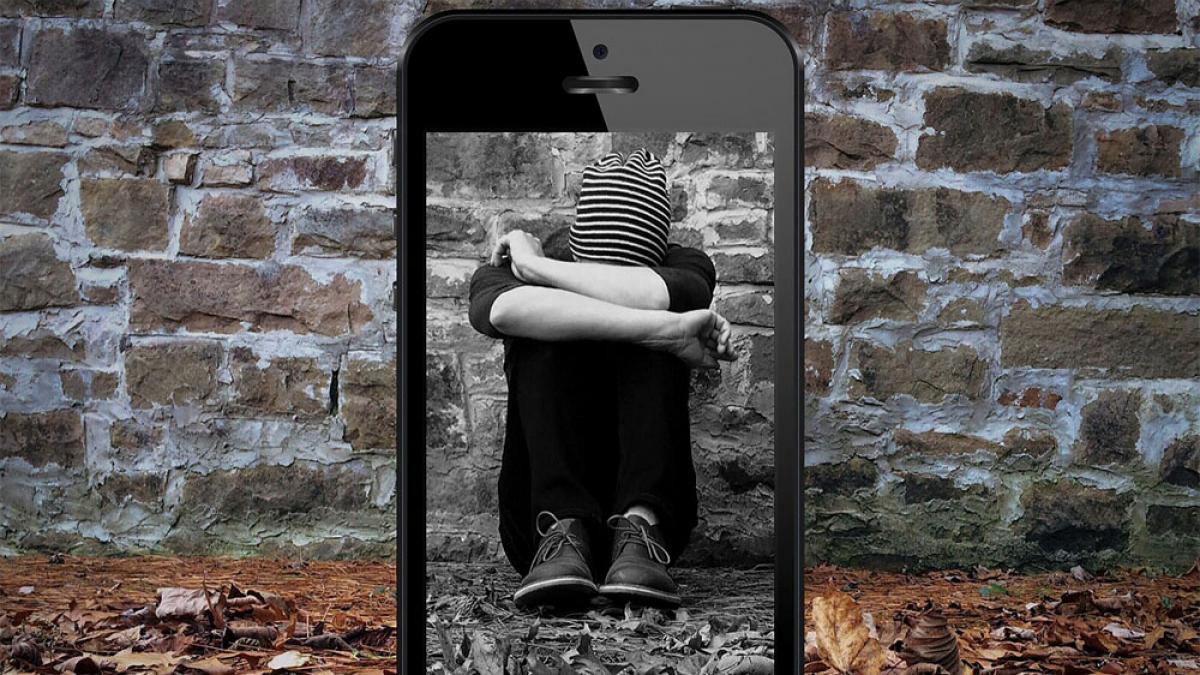
Undark Magazine featured Athletic Director Mark Brown and Associate Provost for Student Success Hillary Knepper in “To Boost Black Men in Medicine, Advocates Turn to Sports”
“Rather than saying, ‘Oh, chemistry, nobody likes chemistry, you’re right, you should just drop that,’ instead now it’s going to be, ‘Yeah, you’ve got to buckle down. And here’s how we’re going to do it,’” says Hillary Knepper, the Pace University’s associate provost for student success.
“People don’t believe they can become what they don’t see,” says Mark R. Brown, the athletic director at Pace University.
News12 featured Pace University’s Lubin School of Business in “Pace University poll: 65% of businesses across region feel they'll be stronger after pandemic”
Local businesses remain optimistic despite challenges brought on by the pandemic, according to a new poll by Pace University. Poll director Dr. Kathy Winsted says they believe businesses will become “more appreciative of the need for work life balance and the ability of people to work from home.” The Pace poll also showed difference between Westchester and New York City requiring employees to be vaccinated.

Pace Business Poll: 65% of Businesses will be Stronger after Pandemic
NEW YORK & PLEASANTVILLE, N.Y. (September 15, 2021) -- A majority of businesses surveyed in New York City, Westchester, and Long Island say they will be stronger after the pandemic, and half of respondents reported being optimistic about the future of business in New York, according to a recently released Pace Business Poll.
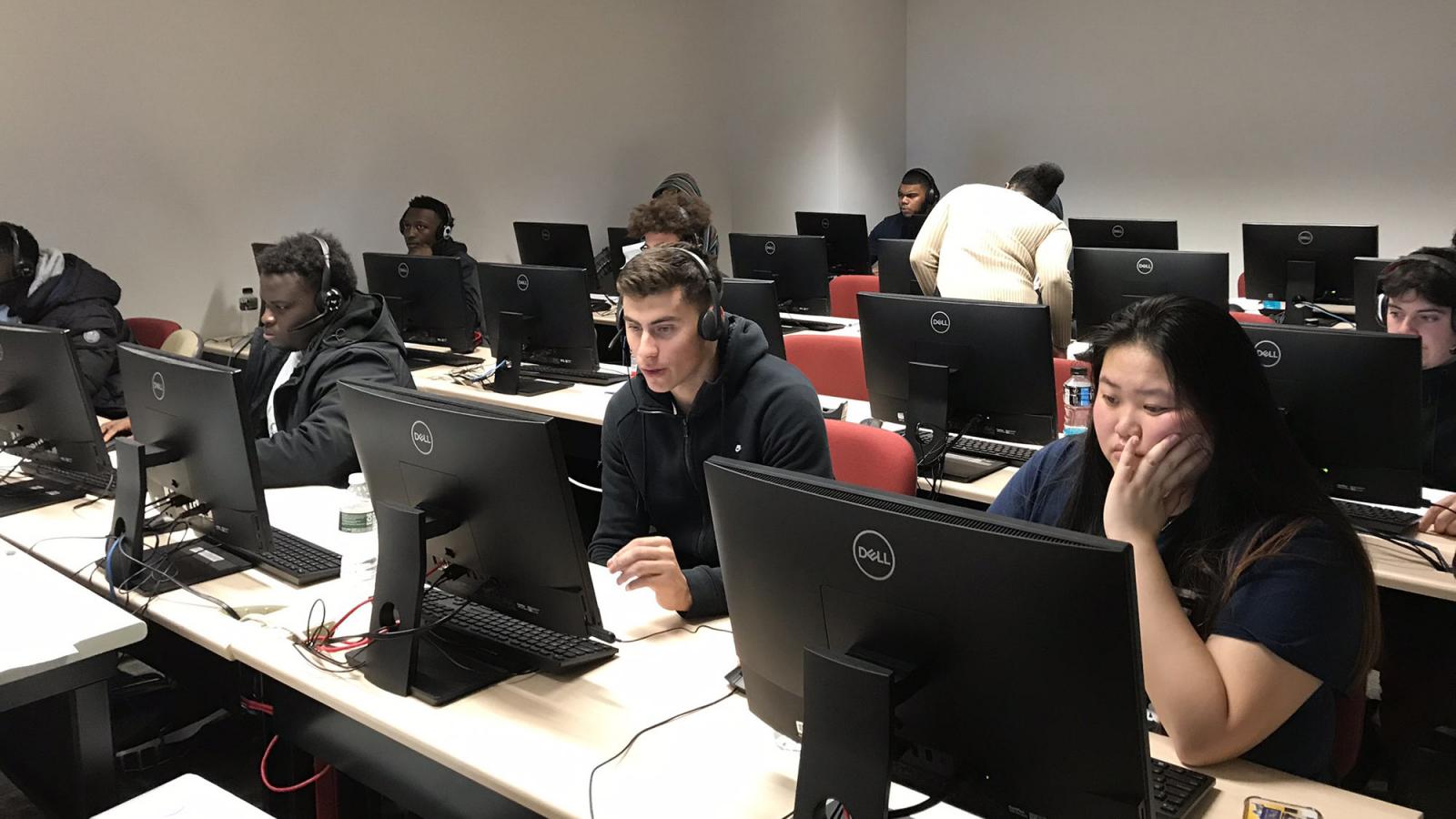
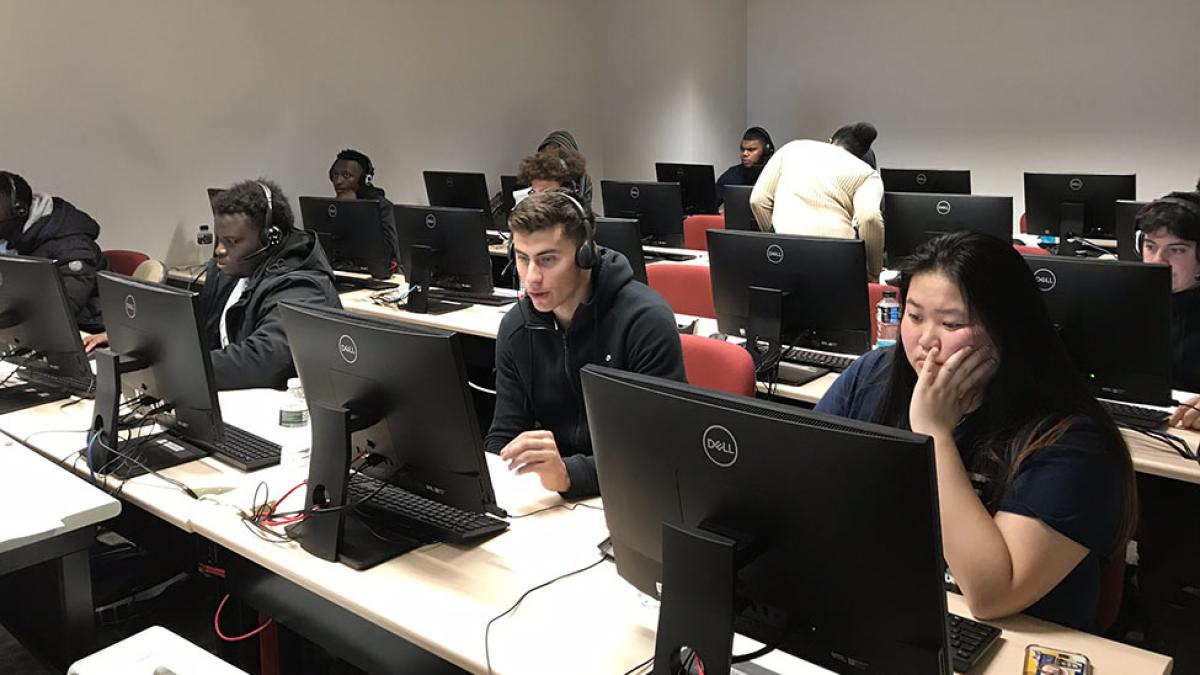
The Lubin School of Business Surveys New York City, Westchester, Rockland and Long Island Businesses
Businesses Remain Optimistic, but Challenges Remain
NEW YORK & PLEASANTVILLE, N.Y. (September 15, 2021) -- A majority of businesses surveyed in New York City, Westchester, and Long Island say they will be stronger after the pandemic, and half of respondents reported being optimistic about the future of business in New York, according to a recently released Pace Business Poll.
While many businesses reported that they were negatively impacted financially and had to implement new procedures such as remote work, most respondents feel that they learned important lessons that ultimately improved their business.
In particular, 65% of respondents said that their businesses will be stronger after the pandemic, in part, because many used the crisis to develop new and improved products or business skills to help them survive.
“The responses from business owners and managers are telling and very hopeful,” said Professor Kathryn Winsted, director of Lubin's Center for Student Enterprise and the Pace Business Poll. “The resiliency showed by many businesses during the pandemic was inspiring, and there is much to be gained by studying how businesses adjusted, adapted, and found new ways to make things work. Many business leaders expressed growing appreciation for the need for work/life balance and the importance of employees’ well-being.”
The results of the Pace Business Poll were announced at The Business Council of Westchester’s Board of Director’s fall meeting. The poll, a partnership between Pace University’s Lubin School of Business, The Business Council of New York State and The Business Council of Westchester, recently surveyed approximately 300 business leaders. The poll was conducted by email and by phone by students at Pace Connect, one of Lubin’s five student-run businesses in the Center for Student Enterprise at Pace. Read the full report here and watch a video about the Pace Business Poll.
“This was a wonderful opportunity to learn more about business and how businesses respond to crises,” said Liang Lin, a senior management major who is general manager at Pace Connect. “It was also very helpful for us to learn how to communicate effectively with business leaders.”
“The feedback from businesses on how they managed their respective operations is as interesting as it is helpful to the business community,” said Marsha Gordon, president and CEO of The Business Council of Westchester. “We are incredibly gratified to be working with Pace University and The Business Council of New York State on this poll, and expect it will continue to provide valuable information and insights on issues that matter to businesses in the region as we continue to rebound from the pandemic.”
The announcement comes as The Pace Business Poll is readying to conduct its next survey, which will focus on return to work, business sentiment, real estate, employee concerns, customer relations, and other issues of interest. Business interested in participating in the next poll can email pacepoll@pace.edu.
“Many of New York’s employers are still struggling as the state’s economy continues to rebound,” Ken Pokalsky, vice president, The Business Council of New York State Inc. “The Business Council found a great partner in Pace University to better understand the needs of businesses, particularly in the downstate region, so we can see first-hand just how much the pandemic continues to impact them even during the recovery process.”
In this first poll, lessons learned during this difficult time included the importance of being more flexible and open minded about implementing new procedures and ideas, improving technology, and taking advantage of the long-term possibility for remote work. Businesses also learned the importance of constructing emergency protocols to help them be better prepared for future extraordinary situations.
Other findings included:
- Nearly three-quarters of responding businesses said that they were not forced to close down in March 2020.
- Only 28% said that they had to shut down at some point during the pandemic. The majority of responding businesses who had to close for a period during COVID said they closed for less than 6 months. Less than 20% had to close for longer than six months.
- Nearly 60% of all participating businesses said that they had been negatively affected financially due to the pandemic. However, nearly one in five indicated that their financial situation improved since the start of the pandemic. Of those businesses that were negatively affected by the pandemic financially, just over a quarter said that their revenue declined by more than 50%.
- Just 39% of responding businesses said that they had to lay off or furlough employees due to the pandemic; 61% said that they kept their workforce the same or even increased it. Of those companies that laid off or furloughed employees, a little over half said all or most would be refilled. Nineteen percent said they would keep the positions empty for at least another year.
More than half of the businesses expressed that they are optimistic about the future of businesses in New York City and the surrounding areas over the next few years. Only a quarter are pessimistic about it and believe that businesses will struggle to recover.
In general comments, many respondents shared their concerns about the future of businesses in New York City due to challenges from the pandemic. Nearly a quarter mentioned that they think that changes are needed in local government and that they are worried about what the economic future in the city will look like without those changes. Many participants also discussed company improvements resulting from the challenge of the pandemic and said they were better prepared now to face future challenges.
The top recovery need expressed by business leaders who responded was assistance in locating new employees with specific skills or experiences, with nearly a third of respondents citing this as a need. Second was financial assistance for cash flow, with nearly a quarter stating that this was a need.
When asked about disadvantages of running a business in or near New York City, 41% said that the cost of running a business was the biggest disadvantage. Taxes were the next biggest concern with nearly one in five saying that New York City’s taxes are too high. Excessive government regulation and long commutes were other items of common concern.
The Pace Business Poll is the University’s first, and complements its strengths as a school with a rich history of excellence in business education. Founded as a school of accountancy in 1906, Pace has one of the largest internship placement programs in the New York metropolitan area, and a combined job placement rate is nearly 90 percent. The Lubin School of Business recently maintained its dual accreditation for both business and accounting by AACSB International, an elite distinction shared by fewer than 2 percent of business schools in the world offering business degree programs.
The Pace Business Poll is part of Lubin’s continued commitment to experiential learning, scholarship, and excellence, noted Lawrence G. Singleton, dean of the Lubin School of Business.
“The partnership with The Business Council of New York State and The Business Council of Westchester is about learning real challenges facing industries,” said Singleton. “It complements our curriculum and further bolsters Pace University’s place in the business community. We’re excited about this ongoing endeavor and eager to be part of its continued success.”
About Pace University
Pace University has a proud history of preparing its diverse student body for a lifetime of professional success as a result of its unique program that combines rigorous academics and real-world experiences. Pace is ranked the #1 private, four-year college in the nation for upward economic mobility by Harvard University’s Opportunity Insights, evidence of the transformative education the University provides. From its beginnings as an accounting school in 1906, Pace has grown to three campuses, enrolling 13,000 students in bachelor’s, master’s, and doctoral programs in more than 150 majors and programs, across a range of disciplines: arts, sciences, business, health care, technology, law, education, and more. The university also has one of the most competitive performing arts programs in the country. Pace has a signature, newly renovated campus in New York City, located in the heart of vibrant Lower Manhattan, next to Wall Street and City Hall, and two campuses in Westchester County, New York: a 200-acre picturesque Pleasantville Campus and the Elisabeth Haub School of Law in White Plains. Follow us on Twitter or on the Pace News website.
About the Lubin School of Business at Pace University
Globally recognized and prestigiously accredited, the Lubin School of Business integrates New York City’s business world into the experienced-based education of its students at Pace’s suburban and downtown campuses, implemented by one of the region’s largest co-op programs, team-based learning, and customized career guidance. Its programs are designed to launch success-oriented graduates toward upwardly mobile careers.
Childhood Education and Literacy Major, Samantha Saumell '22, publishes her first book "I Have, Not I Am"
Childhood Education and Literacy Major, Samantha Saumell '22, published her first book. Available on Amazon, "I Have, Not I Am," is a touching and inspirational story about a young girl's journey, after being diagnosed with anorexia.
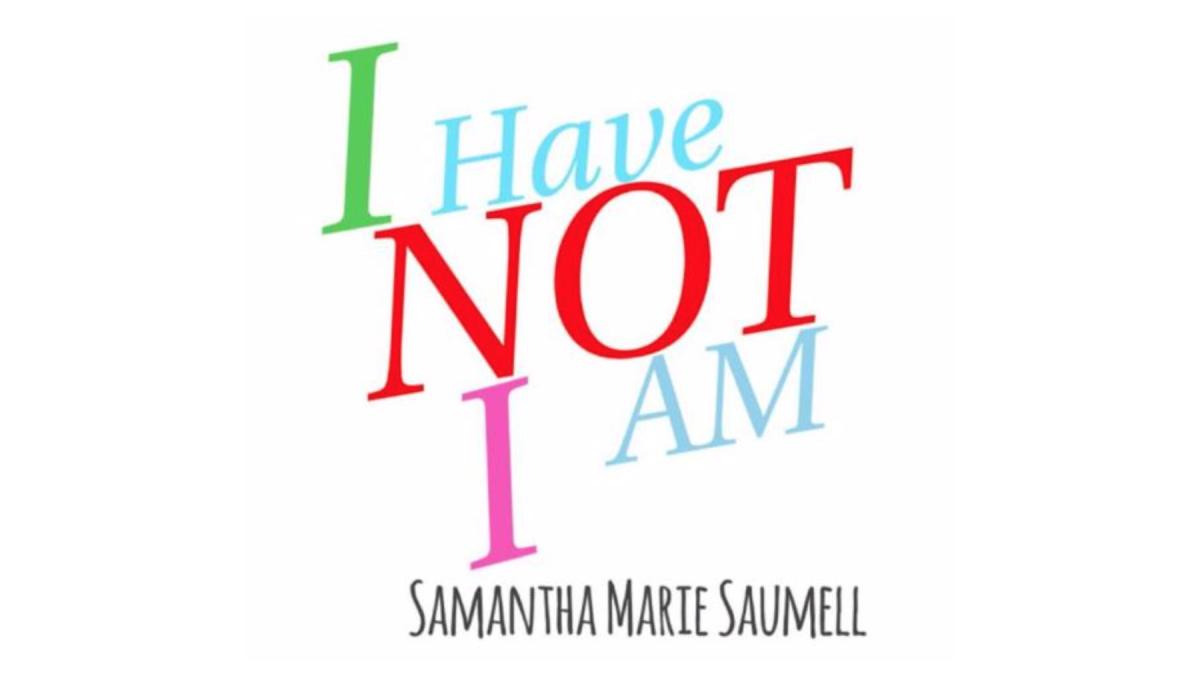
Congratulations to Childhood Education and Literacy Major, Samantha Saumell '22, who just published her first book! Available on Amazon, "I Have, Not I Am," is a touching and inspirational story about a young girl's journey, after being diagnosed with anorexia. Our March 2021 Student of the Month, Samantha is a highly engaged student, dedicated to academic excellence and volunteer work. In 2020, she also published an online article at Penn State on building positive relationships with students who come to writing centers for support.
We caught up with Samantha to gain a little insight into her story and her perspectives on education, writing, and more!=
What inspired you to write this book?
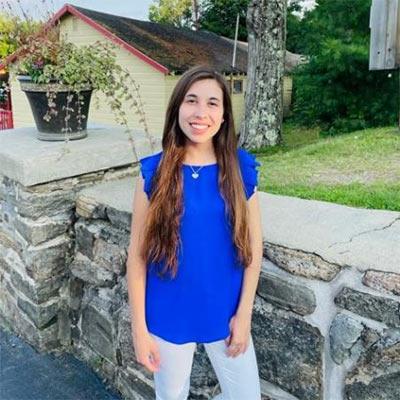
When I think about what inspired me to write this book, two main ideas pop into my head. I decided to write this book because as I was dealing with anorexia, I experienced many people defining me by my struggle, rather than who I was as a person. I thought about how other people may be experiencing what I did, and I wanted to help people feel like they aren’t alone. My second inspiration for this book were my students. As I have started my career in education, I often find myself encouraging my students to accept who they are and to never be ashamed of who they are. For me, writing this book was a way for me to accept everything I have been through. It was a way for me to say yes, I did battle anorexia, but it made me who I am today.
Can you tell us a little about the book, and who it is for?
This book was written for people who have an eating disorder as well as for their loved ones. Throughout the book, I give advice to those struggling in order to encourage them to never give up. I also provide advice to the loved ones of people who are currently struggling because eating disorders are by no means easy to understand. I hope that my story will inspire people to be more accepting and understanding.
What does the title mean?
The title is meant to emphasize that a person may have an eating disorder, but they are Not their eating disorder.
When did you start writing and what do you love most about it?
Writing has been a passion of mine since as long as I can remember. I love writing because it allows you to discover thoughts and ideas that you may have never thought you had. Writing is a powerful tool!
If you could spend a day with another popular author, whom would you choose?
I don’t have a specific author in mind, but I would love to spend a day with a successful children’s book author. I love the idea of having one of my stories come to life and I am interested in writing a children’s book next!
Now that you are a published author, what do you think this can bring to your teaching career?
As a published author I hope to lead by example. I can show my students that they can reach their dreams if they work hard. I also bring a greater knowledge of the writing process into my classroom. Writing this book has allowed me to see just how important it is to always revise and edit your writing.
Why teach?
Teaching has always been my passion and to be perfectly honest is one of the reasons I was able to recover. I always knew that I wanted to be a teacher and the only way for that to happen was if I was healthy. Every time I walk into a classroom, I am reminded of why I picked education as my lifelong career. Teachers truly have the power to make a difference!
What does the future have in store for Samantha Saumell? Do you plan to write another book?
My hope for the future is to finish my master’s degree and hopefully get a permanent teaching position in an elementary school.
Yes, I would love to write another book. I really want to write a children’s book!
What advice would you give to aspiring, young writers?
My biggest piece of advice to aspiring young writers would be to always believe in yourself. There are going to be people who try to make you feel like your dream is unattainable, but with hard work it is possible.
Enjoy the Silence
Emmy Award-winning producer and Media, Communication, and Visual Arts Associate Professor Allen Oren explores the beauty of quiet and “meaningful silences” in our world in his latest documentary, A Day in the Life of Silence.


Sirens from a city street. The laughter of children. A text message notification. Sound comes in many forms, is ubiquitous, and informs our experience of life. What if an opportunity, however, existed to behold an entire day, from dawn to dusk, in complete silence? Or, on a larger scale, from birth to death?
Associate Professor of Media, Communications, and Visual Arts Allen Oren, a faculty member in the Department of Media, Communications, and Visual Arts since 1985, has brought that unique experience to the screen.
Oren highlights the beauty of quiet and “meaningful silences” in our world in his latest documentary, A Day in the Life of Silence, which premiered in earlier this year on WNYE and will continue to be shown on public television nationally throughout the spring and summer." The film guides viewers around the globe with beautiful images and quotes related to the importance of silence, and, appropriately, it consists of little to no audio.
This is quite a new approach for Oren, an Emmy award-winning producer whose professional background in journalism found him in mostly vociferous roles, in front of the camera or narrating. When video shutters are closed and lights are off, however, he returns to the state he also enjoys—silence.
“When we’re finally gone, we all share a certain kind of silence. But while we’re here, we’re partly defined by the silences we prefer.”
Although Oren does not consider himself an introvert, he has always had a personal connection with quietude. After college, he spent a year within the whispers of libraries as he read his way through history, and among his first journalism pieces, he visited a silent monastery for a week, and also profiled the peacefulness of a cemetery keeper. Throughout the film, Oren displays these destinations, alongside many others, as “silent friends” from his life.
A major aspect of his experience creating this documentary included learning how fellow humans from around the world experienced silence during the coronavirus pandemic and related quarantine. Some may have been distressed by the forced stillness; others restored. By viewing this film, we are given a lens to understanding how meaningful silence truly is to Oren, as well as reflect on its meaning and place in our own lives.
He said, “When we’re finally gone, we all share a certain kind of silence. But while we’re here, we’re partly defined by the silences we prefer.” As a filmmaker, Oren has received many Emmy nominations, including two for his first faith-based film, 18 Voices Sing Kol Nidre (2011), about Judaism’s sacred prayer. It aired on public television, as did another film, The Four Sons and All Their Sons: A Passover Tale, about a story told at the Passover Seder.
Oren plans to continue to produce films and speaks of an “ideas file” at home that he dives into quite often. Independent projects, however, tend to take a bit of time, and his work on A Day in the Life of Silence has only highlighted the importance of stillness in the creative process.
“I’ll savor this one in the meantime,” he said.
Pace Now
Nursing student Nicholas Lombardo '22 had experienced a life-changing injury in high school. Though he's long-since recovered, that experience has put him on the path to a career in the health professions, where he can combine his love of science and his desire to care for others.
Professor and NYC Design Factory director Andreea Cotoranu is teaching students how to solve tomorrow’s problems. In partnership with major corporations and international collaborators, students have pitched ideas like noise-absorbing drones, massive-scale food cooling systems, and a modern take on teen furniture design.
Alexander Romans ’21 only started painting last summer, but he’s already taking the art world by storm. Known as Harris-Lee Rose, he’s been featured in art exhibitions both locally and internationally, and he’s even posting videos of his late-night painting sessions.
KFI AM 640 featured Dyson Professor Brenna Hassinger-Das in “How To Maximize Play Time With Kids With Science-Backed Tips | 98.5 The Cat | Chris Davis”
“We know kids in Western countries spend only 20% of their time at school, so where are they for the other 80%?” Hassinger-Das said. “They’re at home, or in the grocery store, or the park. How can we transform those everyday spaces to encourage playful learning and promote conversations between caregivers and children? We wanted to maximize these spaces and turn them into places that are fun but also support the kind of learning you do in school.”
A Life-Changing Experience
Nursing student Nicholas Lombardo '22 had experienced a life-changing injury in high school. Though he's long-since recovered, that experience has put him on the path to a career in the health professions, where he can combine his love of science and his desire to care for others.
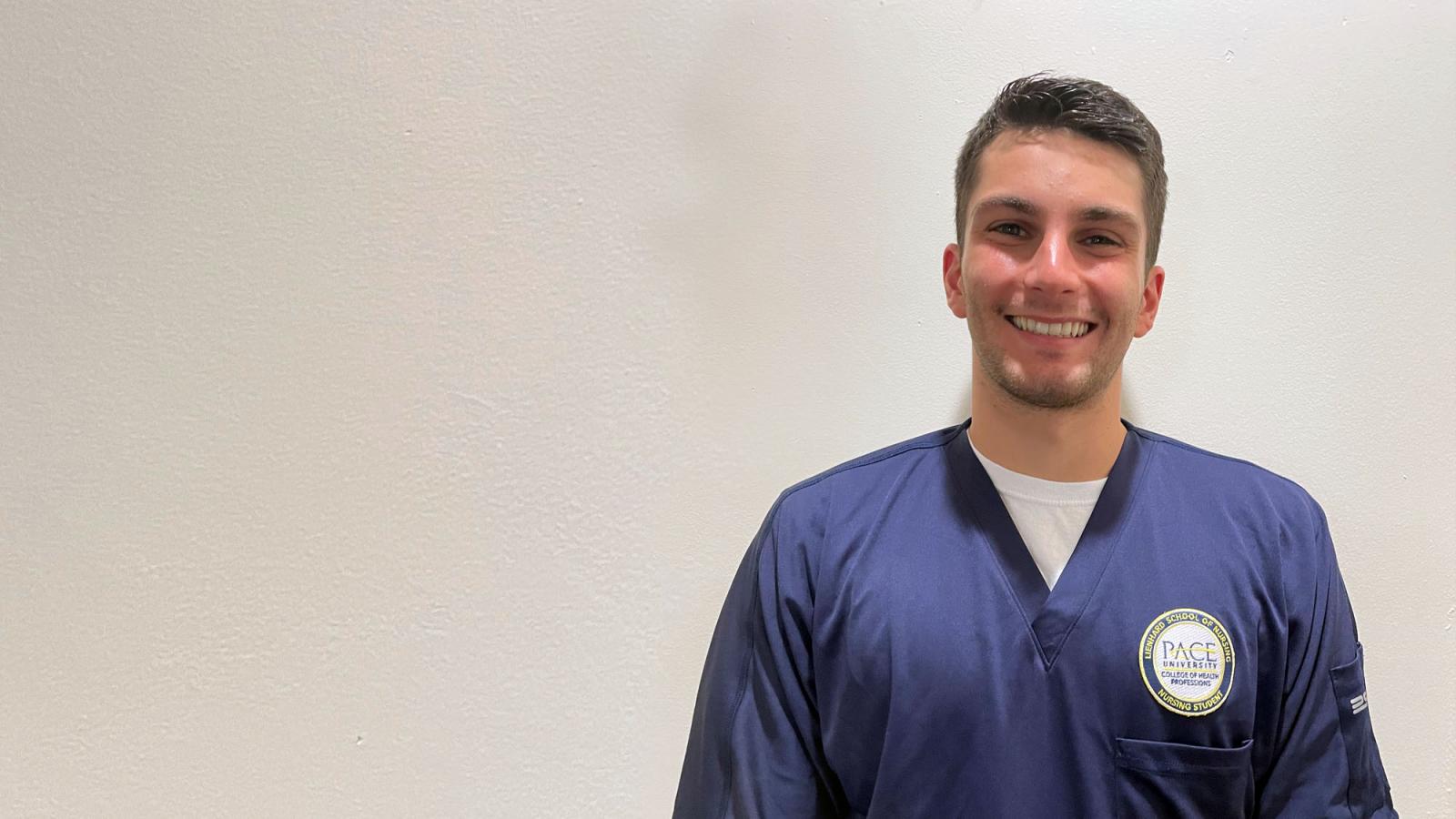
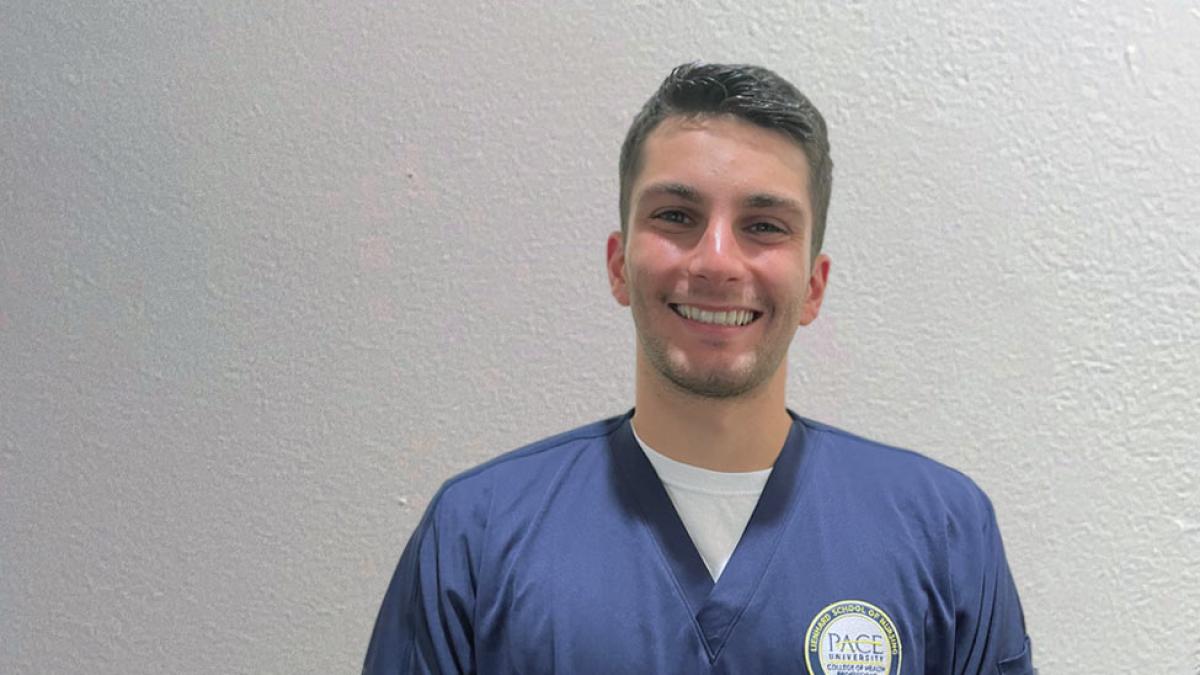
Nursing student Nicholas Lombardo '22 had experienced a life-changing injury in high school. Though he's long-since recovered, that experience has put him on the path to a career in the health professions, where he can combine his love of science and his desire to care for others.
I chose Pace for its location and nursing program. Since Pace is located in New York City and Pleasantville, it gives me access to some great clinical experiences at some of the top hospitals in the world such as New York Presbyterian, Mount Sinai, and Westchester Medical Center. The nursing program here at Pace in one of the best. When I came in as a freshman, I was very nervous. I didn’t know if I had picked the right major, and I was worried about all of the new information I was going to learn and if I would be able to remember and apply it in a clinical setting. The entire nursing department here at Pace College of Health Professions reassured me that this was the right choice for me and has been helping me and all of my fellow classmates throughout our time here. I have been able to learn new skills through in-depth lectures, and I am able to practice these skills in the virtual simulation laboratory. The nursing faculty and staff here want you to succeed. The professors have open office hours in case you have any questions or need help with a topic, the virtual simulation lab has many open hours which allows you to enter, practice and refresh clinical skills, and overall, the entire department is here to help. This is why I would recommend the Pace nursing program to any incoming students.
I chose nursing after an incident that occurred in my freshman year of high school. I fractured my skull and was rushed to surgery. Before the surgery, I saw how the nurses in the hospital comforted me and my parents at a hard time in our lives. After surgery, I saw how they cared for me and the other patients around me. I watched them administer medicine, check vital signs, and provide therapeutic care. I knew that I enjoyed science and wanted to help others and realized that becoming a nurse was the right path for me.
The transition from high school to college was difficult for me. I was leaving many of my friends from my hometown and going into a new place where I didn’t know anyone. These difficulties were short lived, though, because through many of the events held on campus and being part of an extracurricular activity, I was able to make friends that I will talk to for the rest of my life.
I chose nursing after an incident that occurred in my freshman year of high school. I fractured my skull and was rushed to surgery. Before the surgery I saw how the nurses in the hospital comforted me and my parents at a hard time in our lives.
Pharmacology was one of my favorite classes because I learned about all the medications that I would be giving when I become a nurse. I learned about what the medication did and any adverse effects to look for. It was confusing at first, but when I actually was in the clinical setting, I was able to identify each medication given and make the connection between what I learned in class and how it was used in the clinical setting.
So far, I have done my psychiatric clinical in Westchester Medical Center. Due to the COVID-19 impact, many hospitals are not giving clinical time. Therefore, Pace has implemented Virtual Clinical through a program called Oxford Medical Simulations which was created by Oxford University. These programs allow me to feel like I am in the clinical setting while being in the safety of my dorm. We meet with our clinical instructor and complete simulations and speak about the problem occurring with the patient, any medications used, and any nursing care that should be implemented for the patient. We then complete the simulation and speak about anything good or bad that happened during the situation. The virtual clinical allows me and many of my classmates to work on our clinical skills while keeping us away from any dangers of COVID-19.
Despite a full schedule of classes and clinicals, I still make time for extra-curricular activities. I am a part of the varsity Men’s Swimming and Diving Team here on campus, and I am the captain of the Men’s Swim Team for the 2020-2021 season.
See more Pace people
Pforzheimer Honors College student Debra Perlman ’21 has been extremely busy in her time here at Pace. She’s been part of the first-year and second-year honor societies, Alpha Lambda Delta and Lambda Sigma, a member of the Pace Women in Tech organization, a participant in Pace’s NYC Design Factory, and even a 2019 Forbes Under 30 Summit scholar—not to mention her internships with major companies.
Morgan Shanske ’21 doesn’t wait for opportunity—she goes out and gets it by launching a new business: Get Morganized LLC. She’s also an aspiring attorney working for a nonprofit and volunteering at the Brooklyn District Attorney’s Office. Keep up!
Economics major Noelle Howard ’19 has been busy: she’s an Honors College student, Model UN award winner, and—get this—a former competitive ballet dancer. Her ambition is on pointe!
RTVI featured Lubin Associate Dean Randi Priluck spoke with RTVI (Russian Television International) about how the pandemic affected the markets.
Lubin Associate Dean Randi Priluck spoke with RTVI (Russian Television International) about how the pandemic affected the markets.

